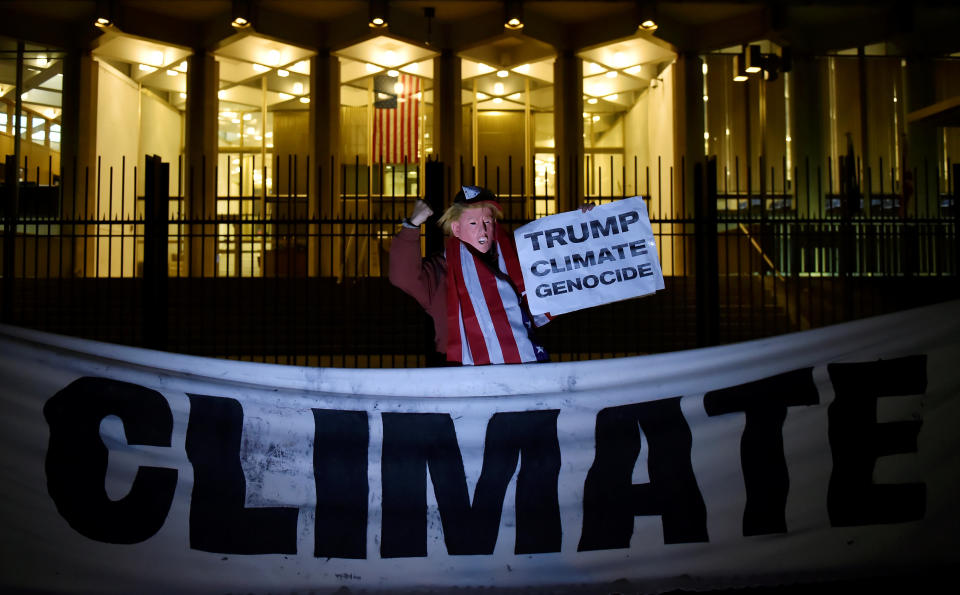Trump faces a climate change conundrum

Does climate change exist, or is it as President Trump has insisted, a hoax perpetrated by the Chinese? You do the math. In recorded history, the 16 warmest years have occurred in this century, last year being the hottest. Any questions? Here, however, is the interesting part: the President has a climate change conundrum. His campaign commitment to cancel and withdraw the US from the global climate accord (the Paris Agreement) which seeks to do no less than save the planet by reducing greenhouse gases, is much like the weather itself. It may be about to change (as have so many other campaign positions of the President). That would be a welcome and momentous shift for the better. Here’s why it matters and why he may ease into this position change beginning at the G7 (Group of Seven) meeting in Italy on Friday and Saturday as the President concludes his foreign trip.
The reasons this would be a positive development are straightforward and have been accepted by the exceedingly large majority of respected scientists around the world. Humans, through our industrialized development, have created increasing greenhouse gases in the atmosphere which continue to raise temperatures, thus melting glaciers and ice caps. The result, without something being done, are rising sea levels which will displace tens of millions of people living on low-lying shorelines, droughts that will deplete global food supplies and lead to famine, increased diseases and extinction of many plant and animal species. Not great. That’s why, in 2015 after two decades of effort, 197 nations singed onto the Paris Agreement, the most comprehensive effort to address climate change ever. Last October, it received enough home-nation ratifications from those signatories that it entered into force.
To date, the disagreements within the Trump Administration about if the President should do as he said and cancel the Agreement have been notable, yet no decision has been made public. Environmental Protection Agency Administrator Scott Pruitt has led the arguments in support of the President’s clarion campaign call to pull the plug, saying it’s a “bad deal” for the US. On the other hand, Ivanka Trump has reportedly been the calm, cool and judicious voice for staying in. (Of note is that Secretary of State Rex Tillerson, the former CEO of Exxon Mobil and supporter of the Agreement, may also have weighed in on the matter, and Secretary of Defense James Mattis has said he views climate change as an issue of national security.)
Interestingly, even some former foes of efforts to combat climate change, namely several coal company executives, have said the US should stay in as a venue for continuing to be part of the climate change conversation. This surprised many, apparently including the President himself, since such a position opposing the Agreement was not only previously popular among coal interests, but with coal miners who…vote. Some emerging nations, with less restrictive mandates for greenhouse gas emissions will continue to burn coal (allowed under the Agreement). US coal companies want that to be their coal. Furthermore, to the greatest extent practicable, coal is best burned in manners which reduce pollution using clean coal technology. To that end, coal executives surely hope cost-sharing programs will be available. Such coal exportation and clean coal technology programs are more likely to assist US coal interests if the US continues to be part of the Agreement.

A decision point is fast approaching as the G7 leaders meet and are expected to discuss the matter. This is an exclusive club comprised of the leaders of highly industrialized democracies. All of the other leaders support the Paris Agreement. On his first G7 foray, would the President really want to come off as a paranoid pariah (perhaps a nut job) on climate change? That possibility is real because some of the leaders haven’t even met each other. Plus, President Trump, French President Emmanuel Macron, and UK and Italian Prime Ministers, Theresa May and Paulo Gentiloni, respectively, have never attended a G7 meeting.
In the event the President chooses to continue to ignore the scientific facts and the majority global view on this matter, there’s one saving grace. Since the Agreement has already been ratified and is currently in force, all 197 nations that were part of the Agreement (including the US) must wait three years before seeking to withdraw, and then another year before actually doing so. Under such a scenario, that would be 2021, after the 2020 presidential election.
Given all of this, it seems likely the President will soon alter his course to “cancel” the Agreement as promised during the election campaign. For the fate of the world, let’s hope he does so.
—
About the Author: Former US Trading Commissioner Bart Chilton was Chair of the Energy & Environmental Markets Advisory Committee, is a political and policy commentator and author of Ponzimonium: How Scam Artists Are Ripping Off America. He can be reached at bartchilton@bartchilton.com.

